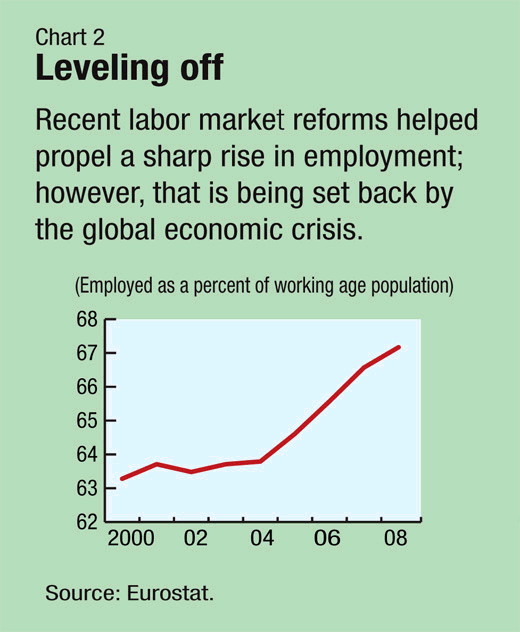
Typical street scene in Santa Ana, El Salvador. (Photo: iStock)
IMF Survey: Avoiding Protracted Decline in Euro Area
July 30, 2009
- Further decisive action required, especially in financial sector
- Reformed EU financial stability architecture urgently needed
- Intensified structural reforms would keep workers in labor force
The euro area economy remains in recession. Although there are tentative signs of improvement, the outlook is still uncertain.

Job-center line in Madrid, Spain: euro area’s jobless rate is set to rise sharply, placing bigger burden on public finances (photo: Sergio Perez/Reuters)
ECONOMIC HEALTH CHECK
More action is needed to support the recovery and a return to self-sustaining growth, and to address cross-border spillovers within the European Union (EU).
In its regular assessment of the euro area economy and EU policies, the IMF said that the path to recovery is complicated by continuing stresses in the financial system, soft demand associated with fragile confidence, and structural rigidities. These rigidities, especially in the labor market, also constrain the area’s potential growth. The unemployment rate is set to increase sharply (see Chart 1), placing an increased burden on public finances.

More action needed in financial sector
To support the still fragile recovery, the IMF called for further decisive action, especially in the financial sector, to prevent the euro area economy from sliding into a protracted period of decline or sluggish growth—such as what happened in Japan during what is called the “lost decade.”
“What is most important for the pace of recovery in the euro zone is how decisive policies are towards revitalizing the banking sector,” Marek Belka, Director of the IMF’s European Department, said July 30. “European economies are bank based and so much depends on the health of the bank sector. The more that is done to clean the banks, to enable them to perform their intermediation functions best, the more robust the recovery will be.”
Belka also stressed the importance of longer-term reforms to boost growth potential. “The pace of recovery depends very much on growth potential. That’s why we ascribe so much importance to structural reforms,” he said.
The financial sector remains key to the shape and the robustness of the recovery, the IMF assessment said. A broad policy arsenal to shore up the sector is in place, but implementation of measures such as recapitalization has been slow.
The IMF therefore suggests taking a more proactive approach that requires a comprehensive review of the financial positions of banks to assess capital needs and viability followed by disclosure, recapitalization, and, where needed, restructuring or resolution of financial institutions.
These policies will have to take fully into account cross-border spillovers. Lack of integrated decision-making at the EU level has resulted in some cross-border tensions that hampered the efficiency of the policy response, although coordination has improved during the crisis.
An active financial sector clean-up is necessary, but not sufficient, to jump start recovery. The IMF said monetary policy should remain accommodative as long as deflationary pressures persist, and fiscal policy must support economic activity throughout 2010.
Ensuring fiscal credibility
Even major policy actions are unlikely to bring about self-sustaining growth if they are not embedded in robust medium-term frameworks that combine both short-term stimulus and appropriate adjustments when recovery is under way.
Given the large automatic stabilizers at work in the EU, the IMF sees planned discretionary measures (of about 1 percent of GDP in both 2009 and 2010) as broadly appropriate. Policymakers should be ready with further stimulus action in case the euro area economy takes a notable turn for the worse. To boost effectiveness and avoid distortions in the single market, the IMF called upon EU countries to coordinate more closely before any further fiscal measures are put into effect.
To address solvency concerns, these short-term actions must be combined with pre-announced fiscal adjustments that are implemented when recovery takes hold. Such policies should be underpinned by the EU’s Stability and Growth Pact, which aims at controlling national deficits and debt. National fiscal institutions also have an important role to play in addressing fiscal solvency concerns, and should focus more on debt levels and the accelerating costs, such as pension and health spending, that accompany an aging population.
Reforming the financial stability architecture
The financial crisis has highlighted the need for new financial stability arrangements in Europe. In this context, the IMF strongly endorsed the ambitious reform of the EU’s financial stability architecture agreed to in June by the European Council —the main political body of the EU, which includes the heads of government of all member countries. The IMF also endorsed the timetable, which envisages the reforms taking place through 2010. Securing adequate resources, effective decision-making mechanisms, and independence for the new institutions that would be part of the new financial stability framework will be essential, as will an unconstrained information flow among these bodies, central banks, and supervisors.

The IMF advises that central banks play a strong leadership role in the proposed European Systemic Risk Board. The Board should provide early warnings of a build-up of systemic risk and will be a much-needed bridge between macroprudential analysis and supervisory and regulatory action. In parallel, accelerated work is needed to address crisis resolution and burden sharing issues, putting in place a robust framework to address possible failures in cross-border financial institutions.
Intensifying structural reforms
Recent labor market reforms have been beneficial, contributing to a substantial increase in the employment rate (see Chart 2). However, the crisis constitutes a setback because it has curbed employment growth, lowered potential output growth, and jeopardized fiscal consolidation. To mitigate this, structural reforms need to be intensified.
Reform efforts are indeed being undertaken as part of EU’s European Economic Recovery Plan. However, the crisis response also includes measures (such as unemployment benefits that are bigger, and longer subsidies for reduced working time) that could harm potential growth if maintained. In this context, the IMF emphasizes that to keep workers in the labor force, it is essential to focus on training, education, pension and health care reform, and to build productivity-enhancing infrastructure with a regional dimension.
Comments on this article should be sent to imfsurvey@imf.org







